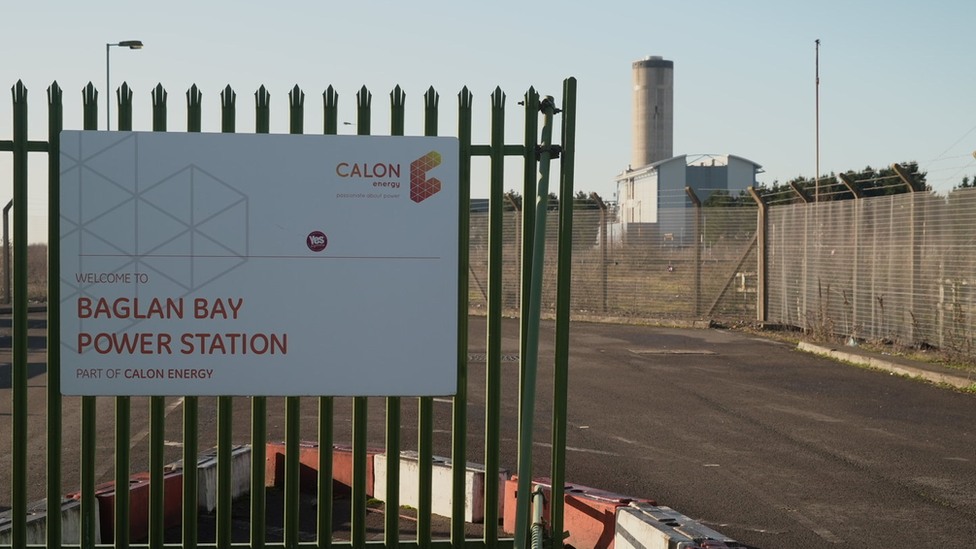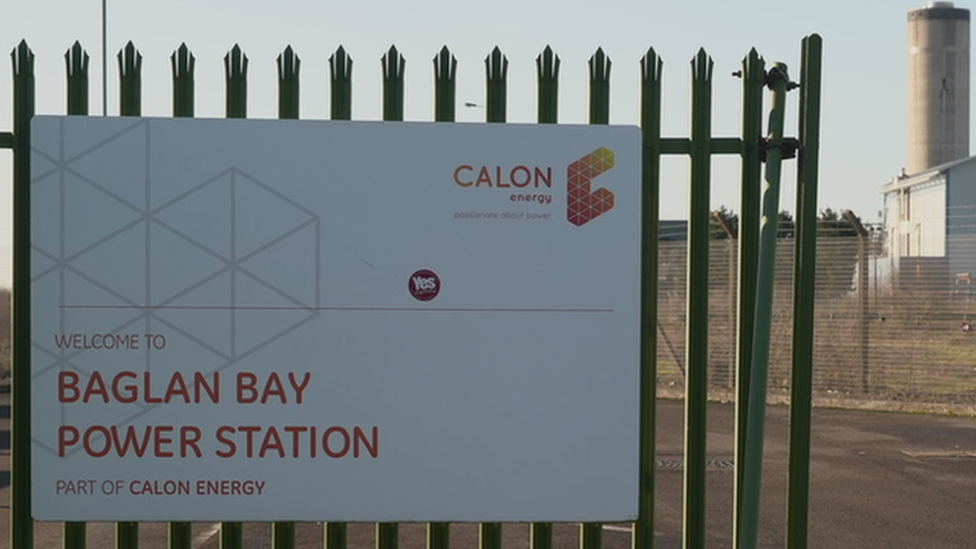Baglan Energy Park: Ministers lose bid to stop power cut
- Published

The power station stopped generating electricity in July 2020
A High Court bid has been lost to stop electricity supplies from a former power station being switched off.
Businesses at Baglan Energy Park in Neath Port Talbot, including a paper mill, face losing electricity supplies as a result after the Welsh government efforts failed.
But power for pumping stations near the site was ordered to continue for another four weeks.
The Welsh government said it was assessing the judgement's implications.
Baglan Bay Power Station stopped generating power in 2020, but through its connection to the National Grid had continued to supply power to firms on its industrial estate.
Under original plans, power at the site was due to be switched off in January, but were kept on pending the result of the court case.
About 1,600 people are employed at Baglan Energy Park. A further court hearing will determine when supplies will be turned off.
An alternative link to the national grid is expected to be set up by the summer.
Jobs warning
Jonathan Ridd, a director of a number of businesses at the energy park, said small firms at the park will now have to foot the cost of diesel generators.
With the rising cost of fuel, this could mean paying "eight times more" for energy, he said.
He said it will affect jobs "without a shadow of a doubt" as businesses could lose customers and contracts, and be forced to downsize.

Jonathan Ridd said small firms face rising diesel costs
Welsh counsel general Mick Antoniw, Neath Port Talbot council, Welsh Water and paper firm Sofidel asked the court for an injunction to stop the power being switched off until alternative arrangements were in place.
The parties had warned of flooding and discharge of sewage into the sea if pumping stations operated by Welsh Water and the council lost power.
Lawyers argued shutting down supplies threatened the human rights of members of the public living and working in the area.
The Welsh government, as a public body, could not make a claim under the Human Rights Act. In dismissing the application, Judge Sir Alistair Norris said the council could also not do so.
While Sofidel and Welsh Water could make such a claim, only Sofidel did, and the judge found it had no right under the European Convention on Human Rights "to the continued supply of electricity by an insolvent company at a loss to that company".

Plans are to connect the energy park to the National Grid
However, the judge ordered the official receiver to continue supplying Welsh Water and council facilities until 18 April.
The official receiver had argued they had no power to continue to supply electricity to anyone once it was no longer needed for the purpose of closing down the plant.
But the judgement argued that the the official receiver's powers did extend to the avoidance of environmental damage.
"By that time the risk of excessive rainfall is likely to be reduced, the need for street lighting a 'safe school route' will have passed, [and] there ought to have been sufficient time for the Welsh authorities to have given any necessary consents," the judge wrote.
He added that it would be subject to "the provision of a satisfactory indemnity" - a contract to compensate for losses - by the Welsh government which covers the anticipated risks and addresses the issue of funding the continued supply.
Paper mill 'can be disconnected'
The judgement specifically dealt with whether Sofidel - a paper mill - should continue to receive power. The judge confirmed it should be disconnected.
"Once a supply of electricity is no longer required for the purposes of the closure and cleansing of the Baglan plant, the company cannot continue to trade for the purposes of supplying electricity to Sofidel on a commercial basis," he wrote.
The decision means alternative supplies would be needed for the paper mill, which employs 328 people.
A diesel generator farm has been installed at the plant, but there are concerns about emissions from the facility.
According to the judgement, Western Power Distribution said that supplies for the council and Welsh Water would be in place by 19 August 2022, and for Sofidel by 30 September, although WPD was said to be confident work could be completed significantly sooner.
A Welsh government spokesman said: "We've received the judgment and are in the process of understanding its full implications.
"The Welsh government continues to work with Neath Port Talbot County Borough Council and Dwr Cymru Welsh Water, and is supporting Western Power Distribution to deploy new infrastructure to all customers of the power station as quickly as possible by providing practical and financial support to help businesses secure their new connection to the grid."
A final order is yet to be issued by the court.
The Insolvency Service, speaking on behalf of the official receiver, said: "Electricity supply to the remaining customers will cease in line with the court order, once made."
Related topics
- Published22 February 2022

- Published21 February 2022

- Published12 January 2022

- Published14 January 2022

- Published13 January 2022
